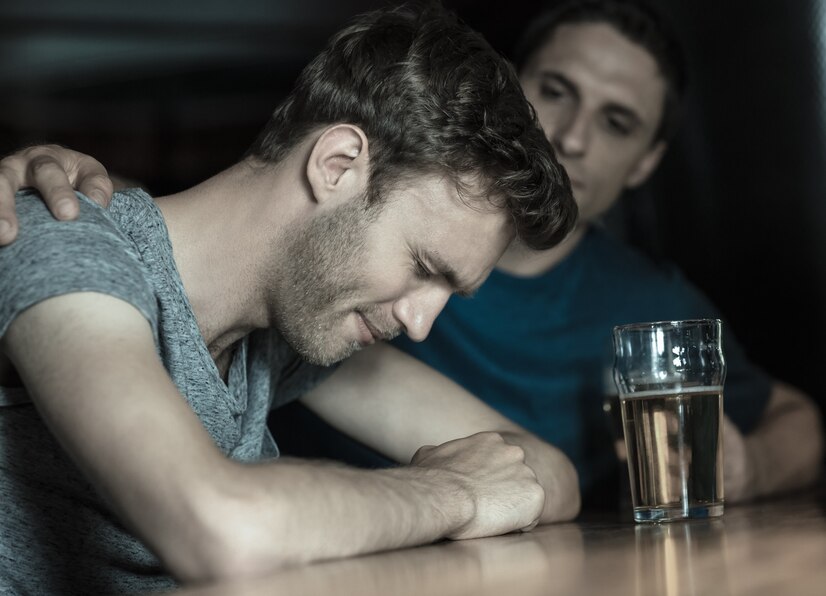Detox and Recovery Centers for Couples
Detox and recovery centers for couples offer specialized programs designed to address the unique challenges faced by partners undergoing treatment for substance abuse. These centers focus on providing integrated care that supports both individuals in a relationship while they navigate the recovery process together. Couples Rehabs is dedicated to offering comprehensive solutions that foster joint healing and reinforce the relationship as a cornerstone of recovery.
By choosing a detox and recovery center tailored for couples, partners can benefit from a supportive environment that addresses their shared challenges and strengthens their relationship as they work towards sobriety. The treatment programs are designed to create a cohesive healing process, helping couples to recover together while enhancing their relationship dynamics.
Contact Us for Professional Services 888-325-2454
Overview of Couples Detox and Recovery
Couples detox and recovery centers offer a specialized approach to addiction treatment, recognizing that substance abuse profoundly affects both individuals and their relationships. These centers are dedicated to providing programs that integrate detoxification with therapeutic interventions tailored specifically for couples, addressing both personal and relational needs.
Specialized Approach to Addiction Treatment
At Couples Rehabs, we understand that addiction does not only impact the individual but also significantly affects their partner and the relationship as a whole. Our specialized approach focuses on treating both partners simultaneously, ensuring that each individual’s unique needs are addressed while also considering the dynamics of their relationship. This dual focus is crucial for achieving successful recovery and maintaining a healthy, supportive partnership.
Integrated Detoxification and Therapeutic Interventions
Our programs begin with a comprehensive detoxification process, which is essential for safely removing harmful substances from the body and managing withdrawal symptoms. This initial phase is closely followed by therapeutic interventions that are designed to support both partners in their recovery journey. These interventions include individual therapy, couples counseling, and group therapy, each aimed at addressing different aspects of addiction and relationship dynamics.
Collaborative Approach to Recovery
At Couples Rehabs, we emphasize the importance of a collaborative approach to recovery. We believe that the journey to sobriety is more effective when both partners work together, supporting each other through the challenges of addiction and recovery. Our programs are designed to foster mutual understanding and support, helping couples navigate the complexities of recovery as a united front.
Customized Treatment Plans for Couples
Customized treatment plans are fundamental to addressing the unique needs of each partner in a relationship, ensuring that the approach to recovery is both comprehensive and effective. These plans take into account the individual circumstances, substance use histories, and relationship dynamics of both partners, offering a tailored strategy that enhances the overall effectiveness of the treatment.
Understanding Individual and Relationship Needs
At Couples Rehabs, our process begins with a detailed assessment of each partner’s substance use history, mental health status, and personal recovery goals. This thorough evaluation helps us understand the specific challenges and needs of both individuals. By recognizing the unique aspects of each partner’s experience, we can design a treatment plan that addresses both their personal struggles and their shared objectives as a couple.
Developing Personalized Treatment Strategies
Our team works collaboratively with each couple to develop personalized treatment plans that integrate individual and joint recovery needs. This approach involves setting specific, achievable goals for both partners and outlining a clear pathway to achieve these goals. The treatment plan includes a combination of individual therapy to address personal issues, couples counseling to enhance relationship dynamics, and group therapy to provide support and feedback from peers.
Incorporating Relationship Dynamics
Effective treatment plans for couples also focus on improving relationship dynamics. Addiction can significantly impact a relationship, often leading to conflicts, communication issues, and emotional strain. Our treatment plans include interventions designed to strengthen the relationship, such as conflict resolution techniques, communication skills training, and activities to build emotional intimacy. By addressing these relational aspects, we help couples develop healthier ways of interacting and supporting each other throughout their recovery journey.
Ongoing Monitoring and Adjustment
Recovery is an ongoing process, and treatment plans must be adaptable to changes in each partner’s needs and circumstances. At Couples Rehabs, we continually monitor the progress of each couple and make adjustments to the treatment plan as needed. This flexibility ensures that the plan remains relevant and effective, accommodating any new challenges or changes in the partners’ recovery journey.
Holistic Approach to Treatment
Our customized treatment plans adopt a holistic approach, integrating various therapeutic strategies and supportive services. This approach ensures that all aspects of the partners’ well-being—physical, emotional, and relational—are addressed. By providing a comprehensive and personalized treatment experience, we aim to foster a successful and enduring recovery for both partners.
What is Detox?
Detoxification, commonly known as detox, is the process of removing harmful substances from the body, focusing on managing withdrawal symptoms that arise when substance use is ceased. As the initial step in addiction treatment, detox is critical for clearing the body of toxins and preparing individuals for more in-depth therapeutic interventions. This phase is essential for laying the groundwork for a successful recovery journey.
Detoxification Process for Couples
The detoxification process for couples involves managing withdrawal symptoms and supporting each partner through the physical and emotional challenges of detox. This process typically includes medical supervision, symptom management, and emotional support to ensure a safe and effective detox experience.
At Couples Rehabs, we offer a comprehensive detoxification process tailored for couples, including personalized medical care, counseling, and support services. Our approach ensures that both partners receive the care they need while addressing any relationship dynamics that may arise during detox.
Challenges of Detox for Couples
When undertaken by couples, detoxification can present additional complexities. Each partner may experience different withdrawal symptoms and emotional responses, which can strain the relationship and complicate the detox process. It is not uncommon for partners to face challenges such as heightened emotional stress, varying physical symptoms, and conflicting needs during this phase. Addressing these issues requires a coordinated and sensitive approach to ensure that both partners receive the support they need.
Detox at Couples Rehabs
At Couples Rehabs, we provide a supportive and medically supervised detoxification process specifically designed for couples. Our approach ensures that both partners receive comprehensive care and attention throughout the detox phase. We prioritize creating a comfortable environment that minimizes discomfort and promotes emotional well-being.
Medical Supervision and Emotional Support
Our detox programs include continuous medical supervision to manage withdrawal symptoms and ensure safety. Experienced healthcare professionals closely monitor each partner’s condition, providing necessary interventions and adjustments to treatment as needed. Additionally, we offer emotional support to help couples navigate the psychological challenges of detox. Our counseling services address the emotional strains and relationship dynamics that may arise during this period.
Preparing for Continued Recovery
The detox phase is just the beginning of the recovery journey. At Couples Rehabs, we focus on making the detox experience as smooth as possible while setting the stage for continued therapeutic interventions. By addressing both physical and emotional aspects of detox, we help couples build a strong foundation for their ongoing recovery and prepare them for the next steps in their treatment program.

Therapeutic Approaches and Modalities
Therapeutic approaches and modalities are pivotal in addiction treatment, especially within a couples-focused program. These methods are designed to address various facets of addiction and relationship dynamics, ensuring a comprehensive approach to recovery. By incorporating a range of therapies, Couples Rehabs aims to support both partners effectively throughout their journey.
Individual Therapy
Individual therapy is a cornerstone of addiction treatment, providing each partner with a private space to explore their personal challenges, substance use history, and emotional struggles. Through this therapy, individuals can gain insight into their behavior, develop coping strategies, and address any co-occurring mental health conditions. Common modalities used in individual therapy include:
- Cognitive Behavioral Therapy (CBT): CBT helps individuals identify and alter negative thought patterns and behaviors associated with substance abuse. It focuses on developing healthier coping mechanisms and problem-solving skills.
- Motivational Interviewing (MI): MI is designed to enhance an individual’s motivation to change by exploring and resolving ambivalence about recovery.
- Trauma-Informed Therapy: This approach addresses the impact of past trauma on addiction, helping individuals process and heal from traumatic experiences that may contribute to substance use.
Couples Counseling
Couples counseling is essential for addressing the dynamics between partners affected by addiction. This therapy focuses on improving communication, resolving conflicts, and rebuilding trust within the relationship. Key therapeutic modalities include:
- Emotionally Focused Therapy (EFT): EFT aims to strengthen emotional bonds between partners by helping them express their needs and feelings more effectively. It focuses on improving attachment and intimacy.
- Imago Relationship Therapy: This approach helps partners understand and address the unmet needs that influence their relationship dynamics. It encourages constructive dialogue and empathy.
- Gottman Method Couples Therapy: This method emphasizes building a sound relationship foundation through enhancing communication skills, managing conflict, and fostering mutual respect and affection.
Group Therapy
Group therapy provides a supportive environment where individuals can share their experiences, learn from others, and gain insight into their behavior. For couples, this therapy offers several benefits:
- Shared Experiences: Group therapy allows couples to connect with others facing similar challenges, providing validation and support.
- Peer Feedback: Participants can receive constructive feedback and encouragement from peers who understand their struggles.
- Skill Development: Group sessions often include skills training in areas such as communication, relapse prevention, and coping strategies.
Support Services for Couples
Support services for couples play a vital role in the recovery process, providing additional resources and assistance to help partners navigate their journey. These services may include counseling, support groups, and educational resources designed to enhance communication and strengthen the relationship.
At Couples Rehabs, we offer a variety of support services to ensure that couples receive comprehensive care throughout their recovery. Our programs are designed to support both individual and relational growth, providing tools and resources to help partners build a healthy and supportive relationship.
Aftercare and Long-Term Support
Aftercare and long-term support are vital for maintaining sobriety and ensuring that the skills and strategies learned during treatment are effectively applied in daily life. For couples, these services provide essential ongoing assistance to help both partners remain committed to their recovery goals. Continued counseling plays a significant role in this process, offering couples a platform to address any new or persistent challenges, refine their coping strategies, and work on their relationship dynamics. This support helps partners navigate the complexities of their recovery journey together, reinforcing their commitment to sobriety and enhancing their relationship.
At Couples Rehabs, we offer comprehensive aftercare and long-term support programs specifically designed for couples. These programs include regular follow-up sessions, individualized relapse prevention strategies, and access to a range of resources to address ongoing needs. By providing continuous support, we help couples transition smoothly back into their daily lives while maintaining their recovery progress. Our focus is on ensuring that couples receive the necessary guidance and tools to tackle any challenges that arise post-treatment, fostering a successful and sustainable path to sobriety.
Detox and Recovery Centers for Couples at Couples Rehabs
Detox and recovery centers for couples offer a unique and valuable approach to addiction treatment, addressing both individual and relationship needs in a supportive environment. At Couples Rehabs, we are committed to providing comprehensive care that supports partners in their recovery journey, offering customized treatment plans, therapeutic interventions, and ongoing support. By focusing on both personal and relational aspects of recovery, we aim to help couples achieve lasting sobriety and build a stronger, healthier relationship. Contact us today to learn more about our dual diagnosis programs and how we can support your journey to recovery.

What is the difference between individual and couples detox and rehab?
A: Individual detox and rehab focus on personal recovery, while couples programs address addiction’s impact on the relationship. Couples programs offer a supportive environment for healing together, improving communication, and building a stronger bond.
How to choose a detox and recovery center for couples?
A: Selecting the right program involves considering factors like:
- Specialized programs: Ensure the center offers tailored treatment for couples.
- Detoxification services: Verify if medical detox is available for both partners.
- Therapy options: Look for couples counseling, individual therapy, and group support.
- Aftercare planning: Assess the center’s post-treatment support.
- Location and amenities: Determine if the center’s location and facilities meet your needs.
Will my insurance cover detox and rehab for both of us?
A: Many insurance plans cover addiction treatment. Couples Rehabs can help you verify your coverage and explore payment options.
How long does detox and rehab for couples typically last?
A: Duration varies based on individual needs and program intensity. Inpatient programs often range from 30 to 90 days, while outpatient options offer more flexibility.
How can couples therapy help in addiction recovery?
A: Couples therapy addresses:
- Communication breakdown: Improving communication and conflict resolution skills.
- Codependency: Identifying unhealthy patterns and establishing boundaries.
- Trust rebuilding: Fostering trust and forgiveness.
- Relationship strengthening: Developing a strong foundation for a sober future.
How can couples rebuild trust after addiction?
A: Rebuilding trust takes time and effort:
- Honesty and transparency: Open communication is essential.
- Consistent actions: Demonstrate reliability and commitment to sobriety.
- Individual therapy: Address personal issues contributing to trust issues.
- Couples therapy: Work together to rebuild trust and intimacy.
How to prevent relapse in a couple’s recovery journey?
A: Relapse prevention involves:
- Strong support system: Rely on each other and involve loved ones.
- Healthy coping mechanisms: Develop alternative ways to manage stress.
- Open communication: Discuss triggers and potential challenges.
- Continued therapy: Maintain regular counseling sessions.
What are the benefits of a couples rehab program?
A: Couples rehab programs offer:
- Shared support system: Mutual encouragement and accountability.
- Improved communication: Stronger relationship bonds.
- Enhanced coping skills: Learning to navigate challenges together.
- Increased chances of long-term sobriety: A united front in recovery.



Recent Comments